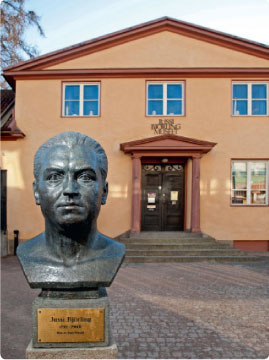Jussi of the Month May 2021
Jussi’s First Tour Abroad, May 1931, and his Swedish Opera Repertoire
After his debut at the Royal Opera on 21 July 1930, Jussi had next spring already eight roles in his backpack. Several of them were rather modest: the Lamplighter in Manon Lescaut, which was his first role, the Poet in Edvin Ziedner’s Bellman and A Songster in Charpentier’s Louise. The debut proper – in those days one had to make three debuts in fairly great roles before one was full-fledged opera singer at the Royal Opera, Nils-Göran Olve has described this in earlier issues of “Jussi of the Month” – took place on 20 August as Don Ottavio in Mozart’s Don Juan and on 27 December followed debut two as Arnold in Rossini’s William Tell, a big and demanding role which arguably wasn’t suitable for an 19-year-old newcomer. Only a couple of weeks later, on 13 January 1931, it was time for the third, Jonathan in Carl Nielsen’s Saul and David. During the spring another two minor roles followed: Bishop Sigge in Natanael Berg’s Engelbrekt and Ruster in Kavaljererna på Ekeby (I cavalieri di Ekebu) by Riccardo Zandonai. When the ensemble of the Royal Opera I May travelled to Helsinki for a guest appearance, those two operas was on the agenda together with Don Juan.
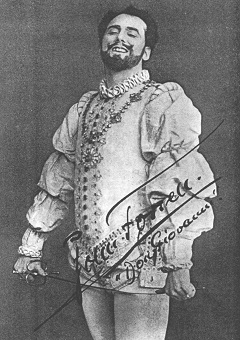
Portrait of Forsell as Don Juan
The reviews after the Don Juan performances in Helsinki were focused on Forsell’s achievement. “An avalanche of flowers and stormy ovations encountered Forsell” read the headline in Stockholms-Tidningen and Svenska Dagbladet was no less enthusiastic: “Don Juan a celebration for Forsell”. The rest of the ensemble was also admired and Jussi also got his share. Svenska Dagbladet wrote: “Jussi Björling’s tenor promises well”, while S-T thought he “shaped his part musically beautifully”. A little more detailed was Svenska Pressen: “Jussi Björling has a sonorous, voluminous voice, which to be sure seemed to be a mite indisposed, in spite of that gave a sympathetic impression”. Svenska Pressen was a Swedish-language evening paper issued in Helsinki by the same company as Hufvudstadsbladet. It was issued 1921 – 1944 and closed down by the censorship at the end of WW2.
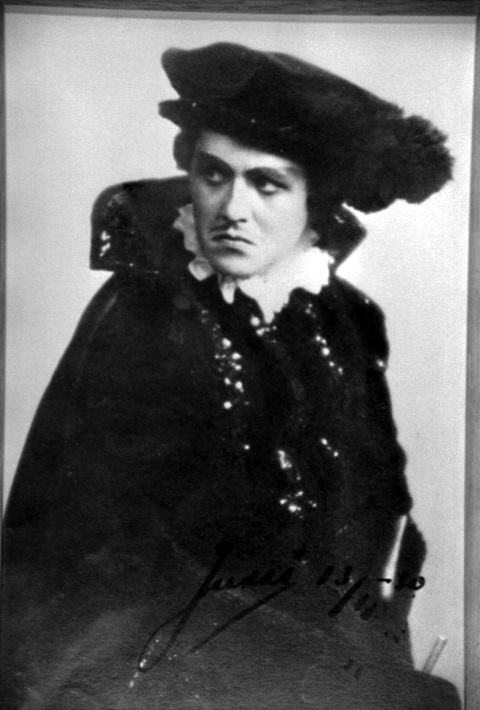
Jussi as Don Ottavio in Don Juan August 20, 1930
The remaining two operas were passed over in silence, at least no clippings can be found in the archives of the Jussi Björling Museum. And the two roles Jussi sang were typical comprimarios. In connection with this it can however be interesting to investigate which Swedish operas Jussi Björling took part in during his time as permanent member of the Royal Opera. There are five, if we also count Kavaljererna på Ekeby, which by all means was composed by an Italian but the subject is the most Swedish one can think of.
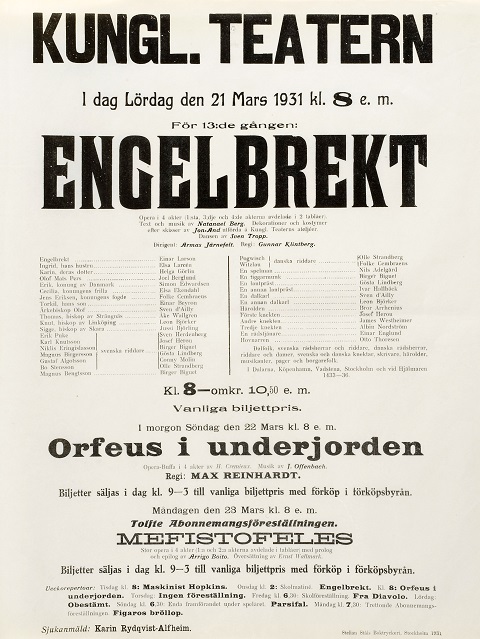
Click on the image to enlarge it
but during the last few decades there has been a kind of revival – at least when it comes to recordings. He wrote several operas, of which Engelbrekt was the most successful and was also played in Germany. Engelbrekt was a Medieval Swedish freedom fighter. Berg also wrote the libretto and the opera was premiered on 21 September 1929 with Armas Järnefelt conducting and baritone Einar Larson singing the title role. He also sang the role in all the 23 performances which were given until 1943. At that time only one scene from act III was performed as part of a gala evening on account of the 25th anniversary of FST. Jussi sang the role of Bishop Sigge on three occasions during the spring 1931, twice at the Royal Opera and the third at the guest appearance in Helsinki.
The same spring he also took on Ruster, one of the cavalieri in Kavaljererna på Ekeby. The opera is based on Nobel Prize Winner Selma Lagerlöf’s Gösta Berlings Saga, and it was composed in 1924 by Riccardo Zandonai and was premiered on 7 March 1925 at La Scala in Milan with Arturo Toscanini conducting.
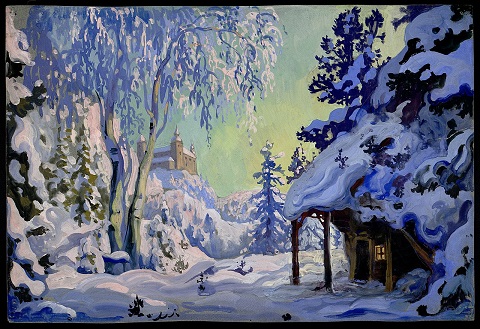
Scenography from The Kavaljererna på Ekeby, act 1, Milan 1925. Exotic! The image is managed by Archivio Storico Ricordii
The management of the Royal Opera learnt about this and decided to get the rights to perform it as a tribute to Selma Lagerlöf in connection with her 70th birthday. They also were allowed to make some changes to the text to make the story and the setting less exotic, and Selma Lagerlöf agreed to rewrite the libretto. Among the changes was a wish to make Ekeby a mansion typical for the region of Värmland instead of the stately palace of the La Scala production. Moreover several minor characters were added, including Ruster, the role that Jussi sang on 12 occasions. The Swedish premiere on 20 November 2028 was conducted by the composer and in the leading roles were Einar Beyron as Gösta Berling, Brita Hertzberg as Marianne and Kerstin Thorborg as the dominant Mistress of Ekeby. The director was Gustaf Bergman, married to Kerstin Thorborg, and the opera was a great success. Until 2 March 1936 it was played 34 times but after that it disappeared from the repertoire. Several numbers were recorded with the original soloists. In the middle of the 1990s it was revived at the Värmland Opera (where else?) with the premiere on 28 December 1994. Ann Sigurdson was Marianne, Margareta Hallin was the Mistress of Ekeby and Lars Cleveman was Gösta Berling. He also recorded two arias on CD.
1932 it was time for the next Swedish opera. It was Hilding Rosenberg’s first opera Resa till Amerika (Journey to America) and it dealt with the Scandinavian emigration during the 19th century. The libretto was by Alf Henrikson and in the two leading roles She and He at the premiere on 24 November 1931 Helga Görlin and Joel Berglund were heard. Jussi sang the Bargeman and Rosenberg conducted. The opera was not a success. It was played five times and has never been revived. An orchestral suite with music from the opera has however become a popular concert piece, in particular the Railway Fugue. Composer colleague Kurt Atterberg had in his review in Stockholms-Tidningen many critical and ironical things to say on textual as well as musical matters. He had by all means also something good to say, primarily on euphonious orchestral episodes – no doubt the music that later was included in the orchestral suite mentioned above – but generally speaking it was thumbs down. Among other things he wrote: “these gentlemen [have] had the misfortune … to only be influenced by … the masterpieces of the opera literature … but unfortunately they have not had the advantage of obtaining for opera writing persons the so immensely essential experience to hear bad operas – and learn from their imperfections.” With the performance per se he was however satisfied. Both Görlin and Berglund were commended, and the latter’s “delightful voice actually carried the whole work”, while “Jussi Björling and Leon Björker were well-singing and well-sounding cameos”.
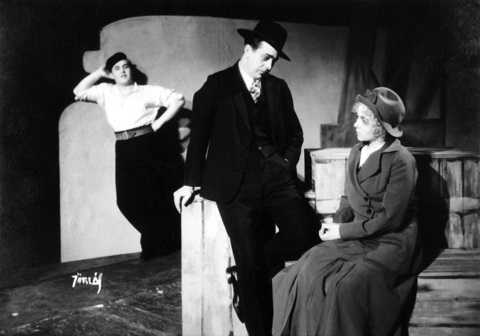
Scene from Journey to America November 24, 1932. Jussi with Joel Berglund and Helga Görlin
Ture Rangström was early fascinated by August Strindberg and even had several opportunities to meet the great author and playwright. After Strindberg’s death he composed his first symphony which had the surtitle August Strindberg in Memoriam. It was finished in 1914 and the next year he completed his opera Kronbruden (The Crown Bride), which is a setting of Strindberg’s play from 1901, but the last act is cut out. It was premiered in Stuttgart, Germany in 1919 and had its Swedish premiere at the Royal Opera on 30 November 1922. The central roles Mats and Kersti were then sung by Oscar Ralf and Göta Ljungberg. The latter had an international career, appearing in Berlin and London and several seasons at the Metropolitan. Kronbruden was fairly successful and was played every year until 1934. Brita Herzberg adopted the role of Kersti in 1927 and Ralf continued until 1932, when Jussi Björling took over for three performances. After that there was a break until 1940 and during the 40s it was seen more sporadically, now with Einar Beyron singing Mats opposite his real-life wife Brita Hertzberg, the last time on 23 January 1949 on the centennial of August Strindberg’s birth. Ten years later the Royal Opera launched a brand-new production of Kronbruden to celebrate the 110th anniversary of Strindberg. Director was Lars Runsten and in the main roles were the young Lars Billengren, recently deceased, and Aase Nordmo-Lövberg. It wasn’t long-lived – after four performances it was put aside. In 1990 there was however a TV-version, directed by Inger Åby. About the performance on 6 April 1933 a note of unknown origin said: “New for the evening was Jussi Björling as Mats. His weak voice, light and shimmering like a Nordic summer-night, joined the somewhat shy and fumbling action to an overall impression, which in this role became exactly what it should be.” Kurt Atterberg was present also this time and he was very positive towards the opera, which in his opinion was “our Swedish opera literature’s foremost work!” Jussi’s achievement was however not to his taste: Jussi Björling succeeded Mr Ralf in the leading male role, but he had not yet taken his ‘Mats’ out of school (untranslatable Swedish pun!). Or, rather: It seemed that Kersti had taken her Mats directly from school. Mr Björling will be good as time goes – we hope.”
And so we reach the fifth and last Swedish opera in Jussi’s repertoire. It was Kurt Atterberg’s Fanal, which had a long run. Between 27 January 1934 and 8 January 1948, it was played 29 times at the Royal Stockholm Opera, every time with Helga Görlin as Rosamund and on 24 occasions with Jussi Björling as Martin Skarp – the last time was on 28 August 1939, when Jussi already had left the Stockholm Opera for the Metropolitan and returned as guest. During a handful performances during the 40s Set Svanholm took over the role.
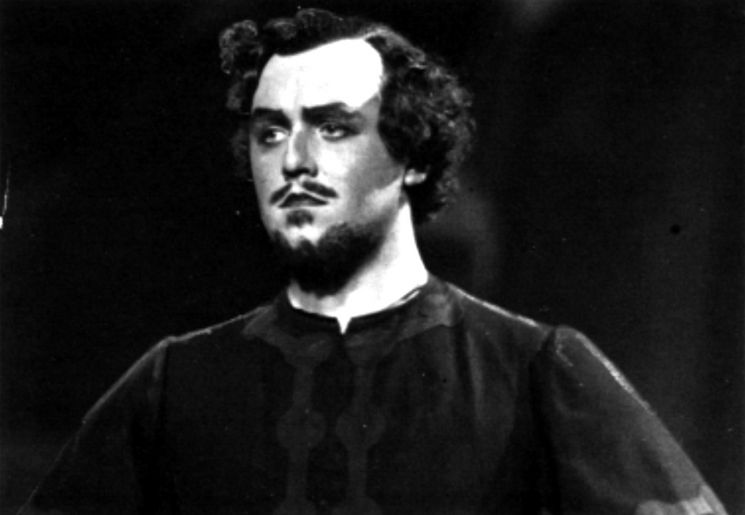
Jussi as Martin Skarp on January 27, 1934
That Fanal was a success is obvious from the reviews, both in the daily papers and other publications. Apart from Kajsa Rootzén in Skådebanan Jussi was also a hit. He “sounds as good as – sometimes even better than [Einar] Beyron. But he has … still a worryingly long way to go to the latter’s scenic security and nuanced dramatic ability to characterise.” Gösta Rybrant in Aftonbladet had a wholly different opinion: “Jussi Björling had the role of his life as Martin Skarp. So Italianately sensually he has probably never sung as in this German-Austrian opera with Swedish music.” Patrik Vretblad in Social-Demokraten was on the same wave-length: “As Martin Skarp Jussi Björling had a vocally brilliant evening, his voice developed a southern brio and his interpretation as a whole was well carried through.” In Svenska Dagbladet Moses Pergament was just as satisfied: “The world premiere was grandiose triumph for composer and participants alike. Jussi Björling developed intensive sonority.” Höd. In Sydsvenska Dagbladet was also complete overcome: “Jussi Björling has probably never sung as well as in his first great role, when he as the son of the executioner pleads to the uproarious peasants to be spared to continue the executioner’s bloody profession.” Likewise Teddy Nyblom in Scenen: “[Jussi Björling’s] tenor blossoms in high summer splendour.”
Also Curt Berg in Dagens Nyheter was satisfied: "The young couple had in Helga Görlin and Jussi Björling very good interpreters. Especially the latter sang the whole evening sumptuously; the moderated power with which he tackled his difficult task and the musical taste he displayed in phrasing and diction could serve as a model for several of his colleagues. Stockholms-Tidningen’s H. A-r., finally, also emphasized the youngsters: “Among the performers in particular Jussi Björling as Martin Skarp and Helga Görlin as the princess were greatly successful. Björling’s role is the central part and the singer, who several times was applauded in mid-act, sang with a firmness and vocal splendour that impressed.” It shall be added that at the second performance, on 29 January, the third act was broadcast, from which fragments have been preserved.
In December 1957 there was a new production to coincide with Atterberg’s 70th birthday. Svanholm was again Martin Skarp and Eva Prytz was his beloves Rosamund. But this production had an even shorter life than Kronbruden – only two performances. Fortunately the premiere was broadcast and there exists a pirate recording which I have managed to get access to. Jussi’s studio recording of Martin Skarp’s aria is of course a valuable gem, and so are the fragments from the broadcast mentioned above.
Click here to listen to Jussi's aria in Fanal, recorded 4 March 1935
More information on Fanal is available on Jussi of the Month January 2014, where the former Honorary Chairman of the Jussi Björling Society, Lars Hemmingsson relates the background. Incidentally he had inside information on the opera since he took part as extra at the new production in 1957.
Göran Forsling




